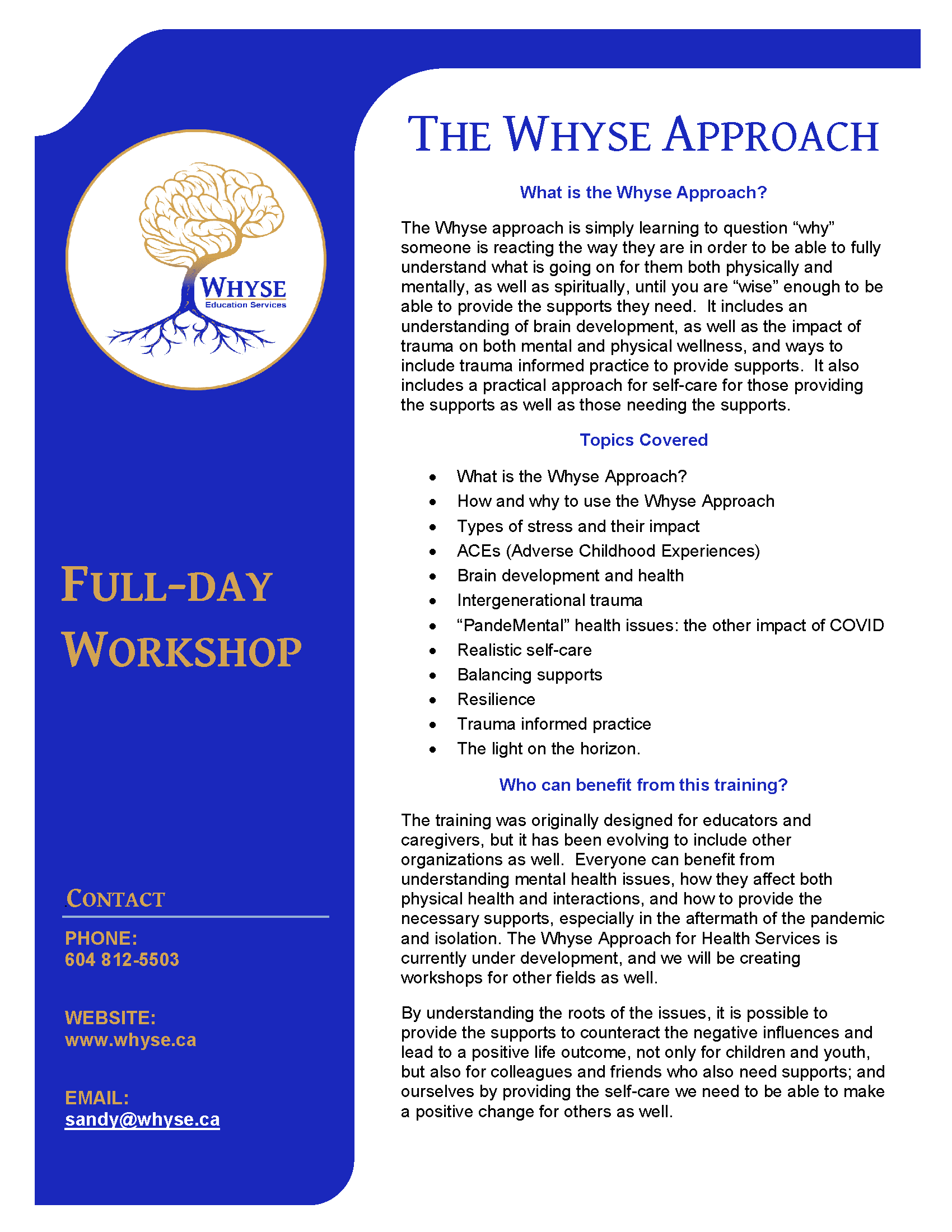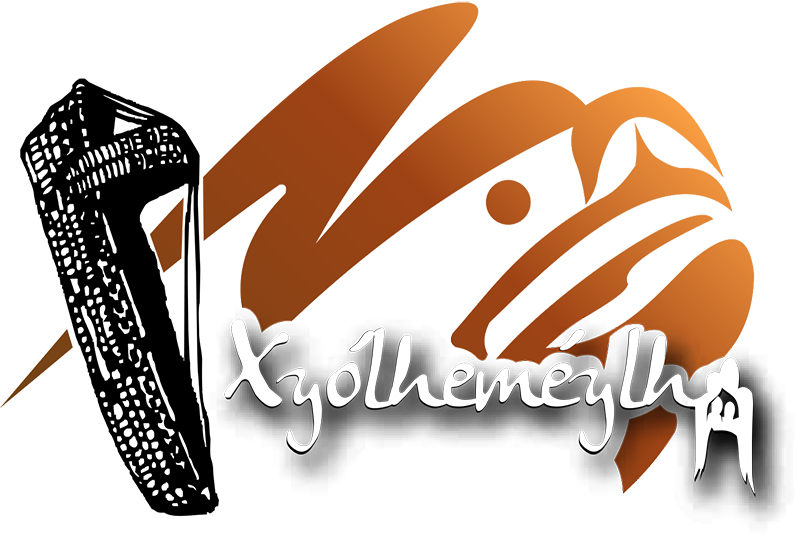Message from the board of directors
Fraser Valley Aboriginal Children & Family Services Society
Sqwélqwel - Xyólheméylh Spring 2022 Newsletter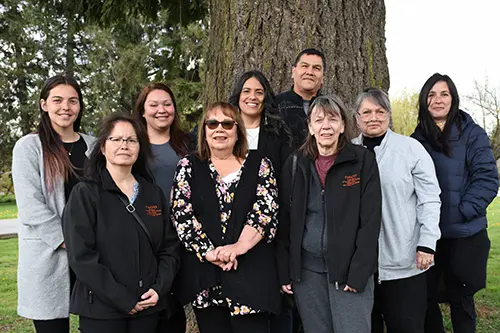
The Board of Directors: L-R - Jade Victor, Paula Olmstead, Jennifer Janik, Glenda Campbell, Jolene Irons-McDivitt, Peter John, Tammy Bartz, Marion Mussell, Dr. Wenona Hall.
It is temqw’íles (spring) time and the syó:qwem (sun) is out
At the February 2022 Board meeting I was elected as the new Xyólheméylh Board President as our outgoing President Marion Mussel had completed her two terms. I was Vice President during Marion’s tenure and paid close attention in order to learn how best to fulfill this current role. I am honored to have been mentored by both Marion recently and Gwen Point previously. I look forward to working with the Board, the ELT and the communities we serve.
At our April 12 2022 Board meeting, the Directors voted to suspend our current Vaccination Policy and immediately begin working on amendments. While the policy is suspended we can no longer require vaccination status be provided by staff, however we do encourage staff to continue to do so as this information helps us ensure our policy (in event it needs to be reinstated given the forever changing landscape of COVID virus) is meeting the safety needs of our staff.
We want to raise our hands to our Xyólheméylh work family for your patience during these unpredictable and trying times. We also thank all the staff who shared their opinions and concerns, your voice is important in our decision making processes. We wish you the easiest transition possible as we implement our back to work plans.
We were pleased to review the floor plans for the new Coqualeetza site building, at the same time feel the sorrow and sadness as Building 1, with its integral history and stories for our People, was torn down. We were eased to hear that our Xyólheméylh Síyelyólexwa (Old People/Elders) are available to help process these feelings.
We are currently reviewing the ELT Strategic Plan and in June the Board will be going on a three day retreat for our Board Planning Session. This gives us time to review our goals and set new ones for the upcoming year. This will also give us time to reflect on our Committee Work, we have been busy to say the least. The Board currently has the following Committees in place:
- Communications Committee
- Governance Manual Committee
- Cultural Advisory Committee
- Finance Committee
- The Act Respecting Committee
Ts’ithometsel (Thank you) for reading our update.
Ey Sqwalewel (with good feeling/heart)
All My Relations,
Ts’qwelemót
Wenona Hall, Board President
Message from Executive Leadership Team
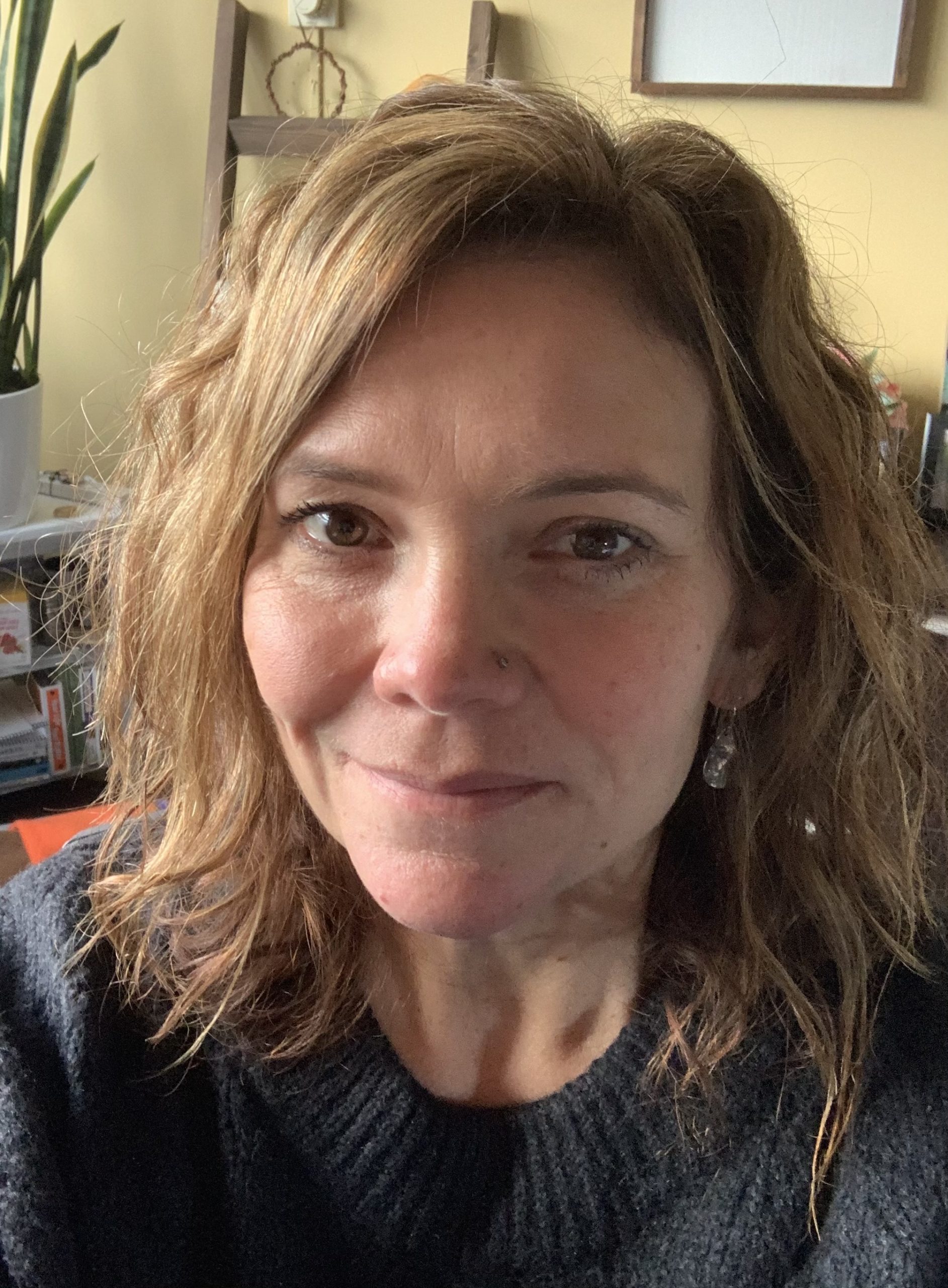
Update from Kyla Darby ED of Programs
As the world begins to reopen and “normal” life is slowly returning, it creates exciting new times for us at Xyólheméylh.
One of the unfortunate and unintended consequences of the pandemic, was the restrictions placed by both the federal and provincial governments on travel. As a result of the restrictions, this created new policy and practice guidelines that we were required to follow. Due to these restrictions, we were unable to have homecoming trips for the children, youth, and families that we have the privilege of working with.
Prior to the pandemic we had completed 24 homecoming trips to various Indigenous communities across the country. The trips sent children, youth, family members, caregivers, and staff to support the connection of the families we work with to their culture, land, and traditions. For some of these families this was the first time they had this experience. During these trips, families were able to experience ceremony and celebration and learnings of their inherent customs and traditions. As part of these trips there was also work completed with the support of the community and family ensuring their voices were heard and respected for future planning for the child(ren) and/or youth.
As we begin to support our children, youth, and families to embark on these homecoming trips once again, it supports the direction of Xyólheméylh as we ensure we are following the federal legislation, an Act Respecting First Nations, Inuit and Métis children, youth, and families while honoring a child(s) inherent right to identity and belonging.
As we witness children, youth and their families walk their lands and connect or reconnect to their culture for the first time, staff have been fortunate enough to witness them find peace and connection. For some families, this is the beginning of a journey to home, health, and stability.
Xyólheméylh will continue to support connection to family, community and culture for our children and youth in care. By doing this it is our intention to continue to reduce the children and youth currently in care, and to prevent more Indigenous children and youth from coming into care.
We look forward to many trips planned for the upcoming summer months and would like to thank the teams of staff, caregiver support parents and Elders for their ongoing support.
Message from penny trites, ED Staff & community relations
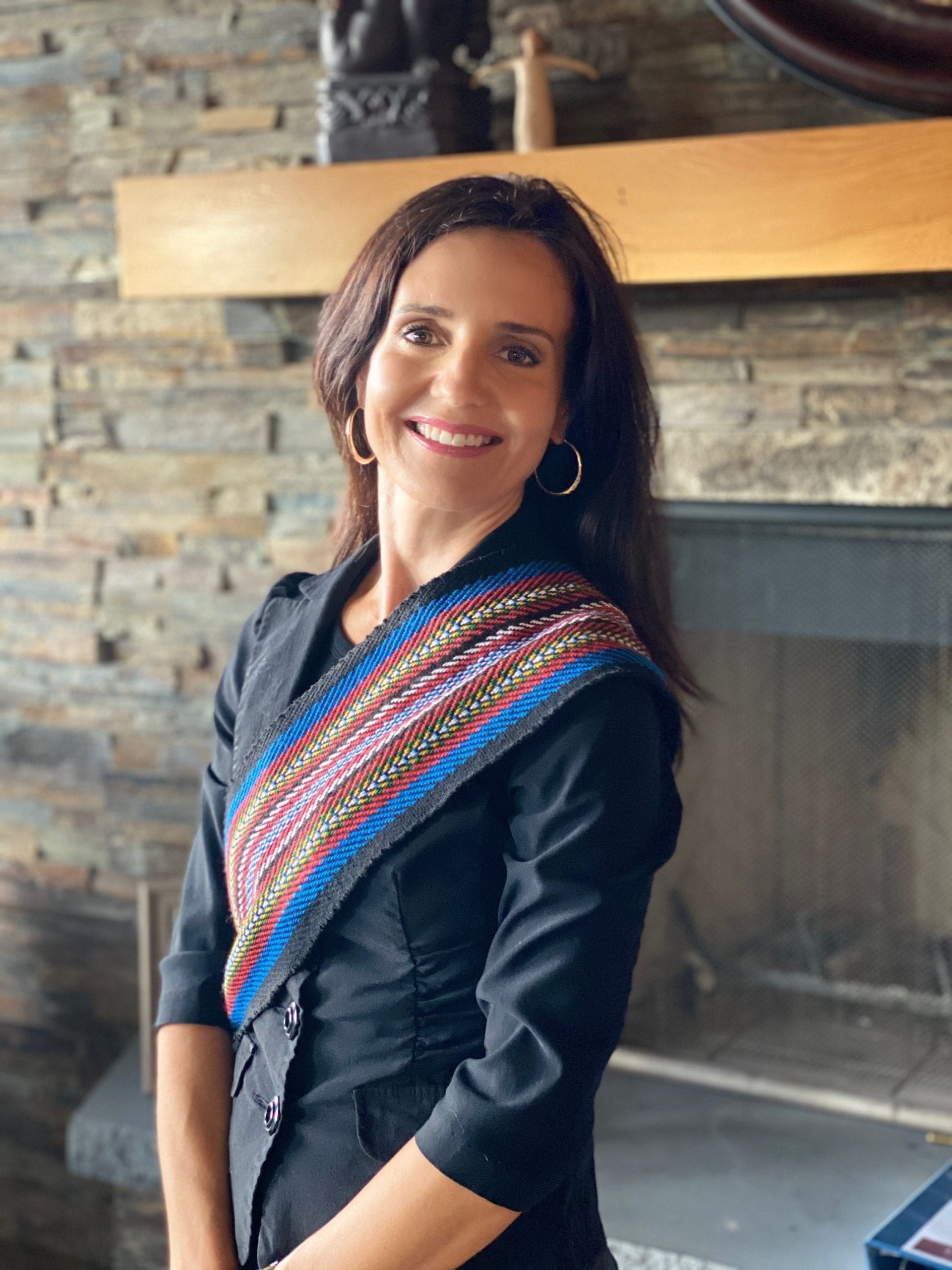
“The Importance of Relationships”
“Relationship is the most important thing we need to be striving for. We can have all the strategic plans in the world, but we have nothing without Relationship.” These are words I hear over and over in my head from a dear respected Sesiamoylh Matriarch who has been a mentor of mine for most of my career.
Having my two-year anniversary with Xyólheméylh at the end of February, made me sit back and reflect on my role and think about future goals for Xyólheméylh and our overall relationships with those we walk alongside in partnership with, and those we work for. I asked myself, “How do we improve relationships with one another as service providers, and leaders so we are working respectfully for the children, youth, and families we are collectively serving? Is our Xyólheméylh work family doing things with a good heart and a good mind as we build relationships with one another and to help make a difference in a person’s life? Are we ensuring that every child and youth we are working for has a relationship to their family … their inherent right to culture and all that they belong to?”
I am currently in Saskatchewan at a Celebration of Life for my grandma, grandpa, and uncle who I met in 1993 after being placed for adoption in 1975. I had the blessing this past weekend to reconnect with many of them who I had not seen since 1996 or had met for the first time. I think I shed more tears this past weekend making photoboards with my aunties and uncles listening to stories, singing songs together, and learning more about my roots than I did as an 18 year old when we initially reunited. I said to my family, “I don’t know where my life would be if I had never met you all.” I got so many hugs and heard the words, “I love you”, “come give me a hug kiddo”, “keep in touch cuz” and the list goes on and on. Knowing what it feels like firsthand made me think of children and youth our agency serves and how important relationships are in all we do.
Our staff are committed to working to ensure all the Indigenous children and youth we work for, have the opportunity to learn who they are and what they belong to. We are also committed to continuing to work towards building long lasting relationships with service providers, leaders, communities, and with one another. By doing so, we can walk together in a good way integrating our hearts and minds to help make a difference for the children, youth and families we are working for. I wish you all the very best as we work collectively in relationship and spring forward into the summer months ahead😊
Penny Trites
Xyólheméylh contest winner's art chosen by minister for provincial card

Over a year ago, Xyólheméylh held a contest asking children and youth to tell us what they were grateful for. We shared the artwork with the Minister of MCFD and two were chosen as finalists for a card printed by the BC government. Congratulations to Summer-Quill, who was 12 years old when she painted the painting above! Her artwork was chosen to be made into a graduation card for BC Youth in Care by the Minister of MCFD.
Meet Caregiver Sandi Edel
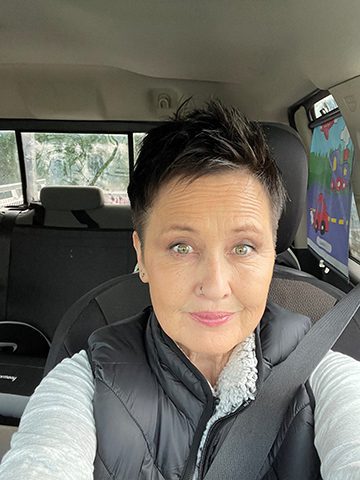
Sandi Edel says caring for children and being a support parent is a calling for her. Years ago, she was a social worker with Xyólheméylh. “I wanted to reach the children when they were younger, before the cycle of dysfunction and trauma in families, so I started fostering when my own daughters were young,” says Sandi.
Sandi is currently a caregiver / support parent to nine children – ages ranging from 15, 14, 12, 6, 5, 2 ½, two 18 month year olds and one 11 month old - two of whom are adopted. She is also the mother of four biological children who are now grown. “It’s a little bit crazy, but I have a lot of help. Xyólheméylh has been really good with supply and supports, so I have people coming in and helping … I couldn’t do it by myself,” says Sandi.
As a child she was adopted herself and wishes she had contact with her family, which is a combination of Métis, Japanese and French. That’s why she believes it’s important for children to have a connection to their biological families when possible, and to have a connection to culture.
Sandi started fostering with Xyólheméylh in 1989. She had four daughters and was a single mom. She then went over to the ministry for a while where she adopted two other children and took guardianship of other children, before returning to Xyólheméylh.
“It’s so important to know where you come from and who you belong to, it’s your whole identity and you are much more grounded when you know,” says Sandi. She says it’s easier now with Xyólheméylh to nurture culture than it was when she was first with the agency. “I’m really happy now that culture and communities are involved in the decisions.”
“I am passionate about advocating for each child’s needs and I’m passionate about keeping them attached, knowing where they come from, working with the families and their community and keeping them knowing who they are,” says Sandi. “I’m also very strong on continuity … I try to keep the bonds, keep the connections and really try to keep them close.”
Sandi says it’s a sacrifice being a foster parent, and that she has lost friends in her age group whose kids are now grown. “I’m with babies and little children that have some special needs, and it’s hard for people who are done raising their kids ... for me though, it’s rewarding. I feel like my calling is to make a difference.”
Sandi and other caregivers make a huge difference, offering safe and loving homes. We lift our hands to you and all the Xyólheméylh caregivers. If you are interested in becoming a caregiver we have info sessions the 2nd Wednesday of the month at 6:30 pm and the 3rd Tuesday of the month at noon. Contact Norma Commodore at [email protected] to register.
New feature: Si:yólexwe teachings
Meet an elder: Laurie Backman
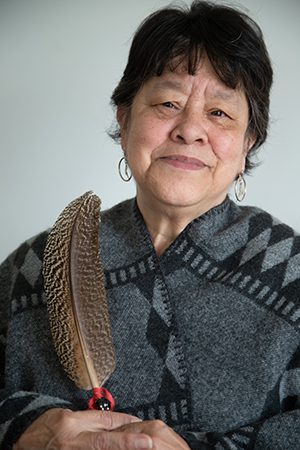
Medicine Teachings with the Elders

Tobacco
Tobacco is used as a sacred plant and is used as an offering of thanks, in prayer, as a medicine or gift. It is an important way of communicating with the Creator and the spirit world. Together with sage, cedar and sweetgrass, tobacco is referred to as the one of the Four Sacred Medicines.
It is said that tobacco sits in the eastern yellow part of the Medicine Wheel. “Tobacco was the first medicine given to us from Creator,” says Elder Maria Reed. “It was given to us so we could communicate with the spirit world. When you burn it, the smoke goes up with your prayers to the creator. When you burn it with the other three medicines, the good smoke from the tobacco takes it to the creator.”
Tobacco is also always offered before picking medicines. It is also used if you seek the help and advice of an Elder Healer or Medicine Person.
- Maria Reed, Xyólheméylh Elder
ask an elder: talking Sticks
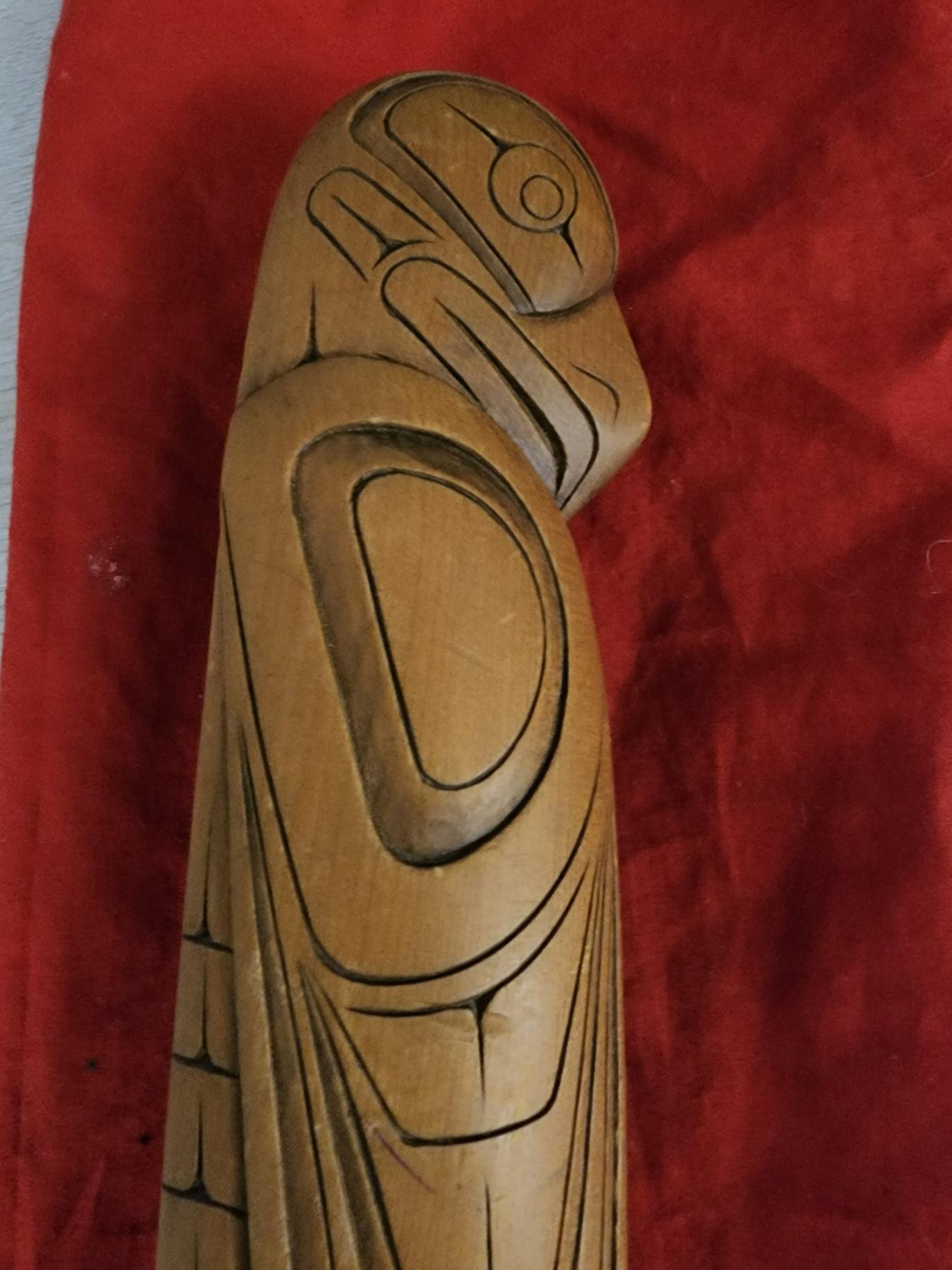
In this edition of Ask an Elder, we asked Xyólheméylh Elder, Gil Poitras, to explain the purpose of a Talking Stick. This is what he told us:
The talking stick has been around for many years, it has been called a speaker’s staff also, but much bigger than we use today, the speaker’s staff is still used at certain ceremonies and certain Elders carry them and are symbolized as authority.
The talking stick is used today as a tool we use to keep order in meetings and certain circles, talking and healing circles, who ever has the stick has the floor all others are asked not to interrupt.
- If an Elder is present, they speak first
- All in attendance are expected to listen
- Listen with respect, compassion
- Allow ample time - do not check your watch
- Turn off your phone
- Interrupting is considered rude
- When the Elder, or whomever, is holding the talking stick has finished speaking, the stick is handed to the next person in the circle
- If the receiver does not wish to speak, it is passed to the next person
- If you are handed the Talking Stick and wish to speak, introduce yourself first
- When everyone who wishes to speak has spoken, the Talking Stick is handed back to the Elder for safekeeping
If you have a question for an Elder, please send it to [email protected]
Community Profile: Shxw’ōwhámél First Nations

Shxw’ōwhámél First Nation is excited to be opening their new Administration / Health Building this upcoming June 20, almost four years after breaking ground on the building. Shxw’ōwhámél people have waited many years for a new building and there was this huge wave of excitement in the air once announced . Alfred James organized many community meetings where he sought members input from the beginning for their ideas on design.
The community has 200 members, with 150 living on reserve, and is located 13 kilometres west of Hope. Shxw’ōwhámél means “where the river levels and widens.”
They have a custom governance system, governed by family leaders called Si:yá:m, a traditional accepted method of governance between ISC and the people of Shxw’owhamel. They are respected people in the community who have been appointed by their families to provide leadership. The councillors have portfolios where committees are created but do not make decisions in their respective field. Instead they provide Council with detailed information and recommendations and Council which then makes the decision as a collective. The system maintains a harmonious, respectful, effective and efficient relationship between the Administrator, Si:yá:m, and the Shxw’ōwhámél First Nation members.
The current Siya:m are: Ken Jones Sr., Tonya Adolph, Lucille Casimir, Dennis R George, Naomi Gutierrez, Irene R Smith, and Melody Andrews.
“The re-establishment of the traditional Si:yam system of governance was brought back in 1994 by Audrey Kelly. This will always be a very important milestone in our community's development. Also, with the construction of new houses and better access to programs and services, this has enabled us to strengthen our community in numbers and begin to re-establish our cultural roots,” says Alfred James, CEO, Shxw’ōwhámél Ventures Ltd.
Another priority for the community is their children and to provide them with a nurtured headstart as the community’s future leaders. “Our vision is to create a healthy, inclusive, cultural based community and provide our people with a good foundation to learn, work and play,” says Dana Andrews, Social Programs and Education Manager.
Shxw’ōwhámél’s Care Committee is led by Elders Roger Andrews and Clara Paull. Their advice to Xyolhemeylh staff is to put aside policy and mandates, to see them as people and to take time to learn their culture, traditions and how different we as a people from modern society.
Meet a FVACFSS Board Member: Jolene Irons-McDivitt
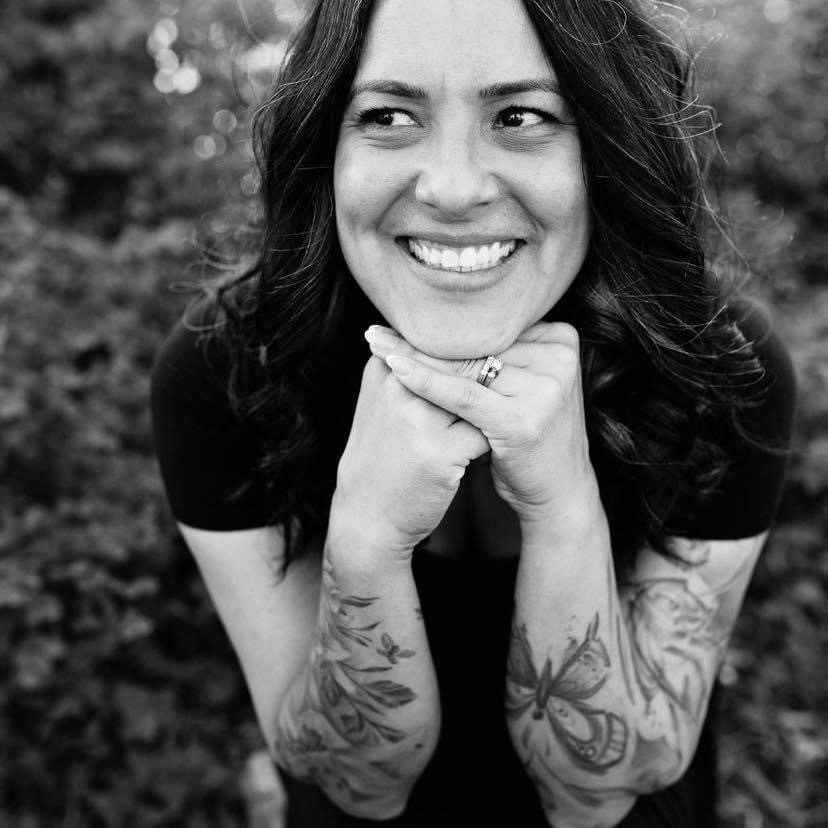
ʔédlánet’é (Hello)
I am Jolene Irons-McDivitt, I am a member of Deninue Kųę́ First Nation, pronounced “Deneh-noo-kweh” meaning Moose Island, located in the community of Fort Resolution, NWT.
I have had the pleasure of raising my family in Stó:lō territory for the last 20 years. I am a daughter, sister, Auntie, wife, and a mother to 1 son, 3 daughters and 1 nephew. My son is a graduate of Ohio University and currently plays professional football for the Hamilton Tiger Cats. My eldest daughter is a UFV graduate from the ECE diploma program and will be pursuing her ECE degree at CapU and my 21-year-old twin girls are the babies, one is a 3rd year Nursing Student, and the other is a 4th year Criminology Major both at UFV. I am the proud Auntie of a 25-year-old, young man whom my husband and I had a hand in raising and I am a Grauntie to his 3 beautiful babies!
As a 60s scoop survivor I was not afforded the opportunity to grow and learn with my bio family, I endured familial struggles throughout my childhood and adolescence which resulted in my being on my own from a young age. After many years of searching, at 25 I was fortunate to be able to develop a lasting relationship with many of my biological family, I am the eldest of 7 in my family of origin and was raised a middle child with 2 brothers in my adoptive family.
Over the years I have worked in various capacities from working in the downtown Eastside with exploited homeless youth to teen moms making a move to more stable work hours after the birth of my second child. After many years working in a corporate setting I felt it was necessary to switch gears and return to working in an environment where I felt that we were making a positive impact. I spent 10 years in varying capacities at Xyólheméylh from 2007 – 2017 and my most rewarding role to date has been with Tzeachten First Nation.
I have attended mainstream university, taken many courses and trainings through out my professional career and although these are all great accomplishments, I am most proud of the personal growth and strength I have received from working through my own trauma, disappointment, and failures. My passion is working with community, it is paramount that we preserve the connection between family, community, and culture and that we honour this by focusing on healing and empowering families.
My hope for staff is that they continue to take a holistic approach when working with the children & families.
To our Caregivers – my hands go up to you! I want to express my gratitude and appreciation for the amazing work you do. I am thankful for your devotion and commitment to the children you parent and welcome into your homes.
I hope our paths may cross one day!
Mahsi Cho – Thank you
Jolene
meet Xyólheméylh’s consultants team
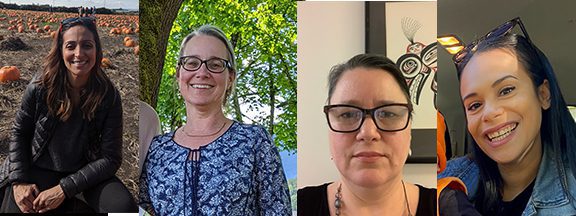
Pictured above: Yasmine Remtulla; Mona Woodfire,Tina Ion and Stacia Jones.
The Consultants are Xyólheméylh’s in house experts. Yasmin Remtulla is the Child Safety Consultant; Mona Woodfine is the Permanency and Transitioning Consultant; Tina Ion is the Client Complaint Resolution Consultant; and Stacia Jones is the Guardianship, Resources and Family Strengthening Consultant. Their job is to promote good practice, ensure continuous improvement and be part of the teams that work with individual families.
Yasmin was the first consultant to be hired. As an example of the work of the consultants, she began by looking at the strengths, needs of the agency and its vulnerabilities. “One of the things the agency didn’t have was a dedicated screening team. It was being done by social workers on top of their other work so I decided to assess the number of screening calls the Agency received, consistency in the Agency’s screening practices, and made a recommendation that the Agency should have their own screening team”,” says Yasmin. The result is that now the agency has a dedicated screening team who are first point of contact for many families and are able to problem solve and come up with appropriate solutions and referrals from the very beginning.
Mona also says that one of their roles is to know the policies and to bring that into all the decisions that are being made within cases so that staff are following the legislative priorities and ensuring that that is embedded in the practice. She explains how that works in the agency:
“Coming from MCFD, I like that we have the policies that we have to adhere to, but we do it in a more collaborative way at Xyólheméylh. The policy tells us what we have to do, but it doesn’t tell us how we do it, so we get to promote working with the families and communities and making decisions that are good for the family, not coming down from above and telling the family what to do. We get to work together in a better way…. The families make the decisions, and it’s a stronger focus here than MCFD,” says Mona.
Stacia also says an important component of the work they do involves identifying training and learning needs. “It’s about identifying areas where we’re experiencing challenges, identifying areas where people aren’t clear on policy, for example there’s been some challenges with care plans, so this group has worked with the training department to develop a forum on care plans which is an opportunity for learning and improving care plans.”
Tina, who is from the Squamish First Nation, is the consultant for client complaints. She deals with an average of 10 to 15 complaints a month on average, some simple and easy to resolve and some very complex and multi-layered. Tina feels strongly that a robust complaints process is very important for the agency. “We hold a lot of power over people’s lives,” says Tina. “It’s important to be accountable to the communities and families we serve. Children’s safety is paramount.” She also feels it’s important that anyone who has involvement with the agency can make a complaint, particularly youth who need to be empowered to self-advocate.
All four women specifically enjoy working for an Indigenous agency, using traditional approaches, working with Elders and matriarchs and Xyólheméylh’s collaborative approach with families with families making decisions. They also enjoy the Agency’s respect for work life balance, the ability to be creative and the value placed on their opinions.
Stacia, who is Indigenous herself, from the Millbrook First Nation in Nova Scotia, says it was important for her to work at an Indigenous agency. “It’s very important for me to work with my people and to fully ensure there is cultural safety in the work we’re doing. She also appreciates being able to do things differently. “We’re able to be creative, to think outside the box and really put the families at the center of the work we’re doing,” says Stacia.
Yasmin also says culture is an important aspect of the work as well as understanding the history of colonialization and its impacts. She says much of the work involves a lot of healing. “Then there’s the cultural piece, we’re not taking culture and putting it at the beginning, middle or the end as an afterthought, culture is embedded in how we think about things, respecting cultural and traditional protocols and embedding that into how we work with our families,” says Yasmin.
Tina loves that the agency promotes continuous learning and growth and that she gets to touch on all aspects of Indigenous child welfare. Mona says one of her favorite aspects of the job is working with the Elders. “I love hearing their perspective and learning from them. It feels so good working with them.”
Recipe: Julie George's scratch cake

This is Elder Julie George's Scratch Cake recipe.
- 1 2/3 milk
- 1 cup sugar
- 1/2 oil
- 1 teaspoon vanilla
- 3 eggs
- 2 cups flour
- 3 teaspoon of baking powder
- 1 teaspoon salt
Mix. Slice peaches on bottom of pan sparkling brown sugar and cinnamon and pour cake batter over peaches
Bake at 350 for 30 mins make sure middle of cake is baked. Enjoy!
CYC Forum
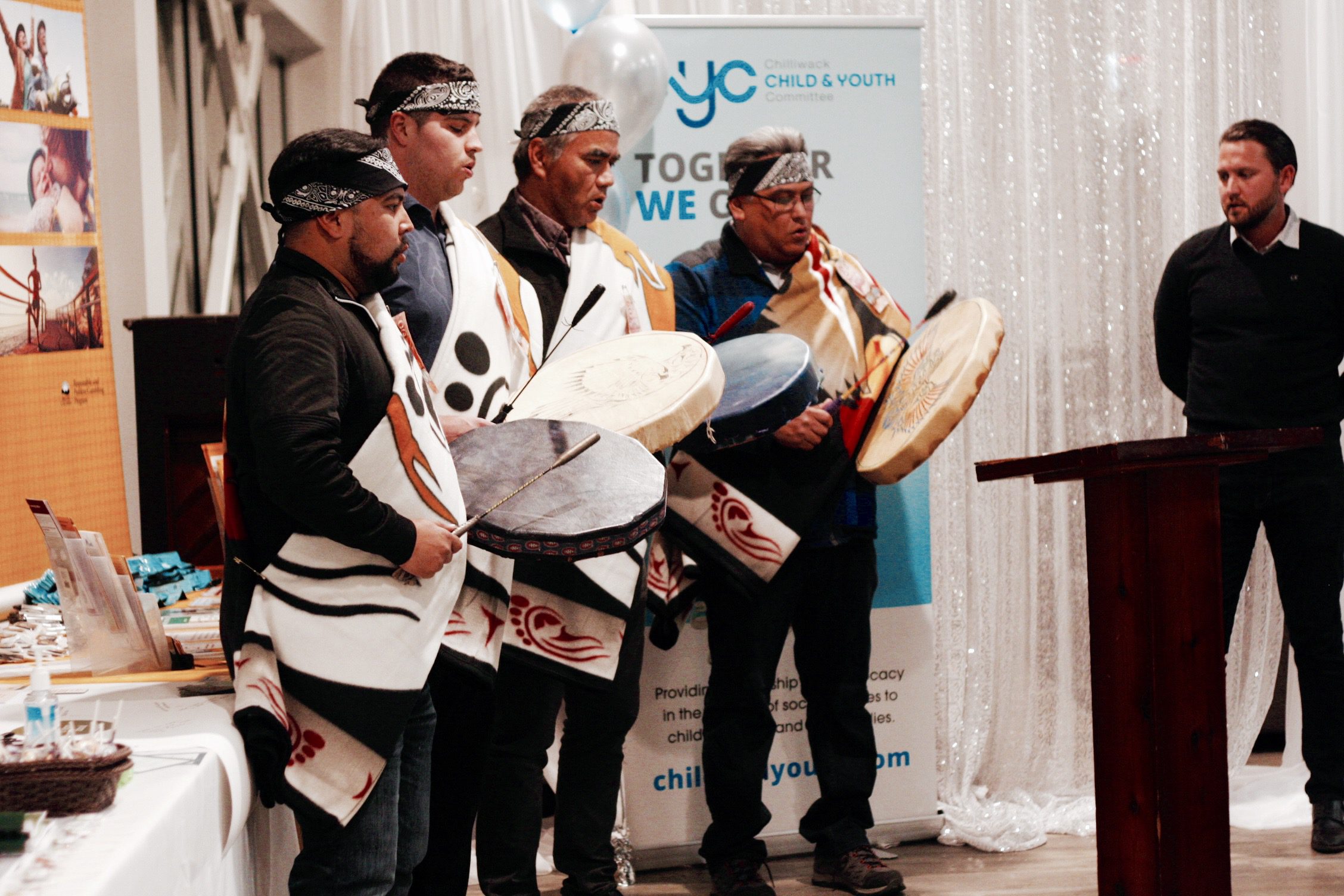
Xyólheméylh participated and was one of the sponsors of the Chilliwack Child and Youth Committee Annual Conversation from April 26 to 29. The theme was Reconnection, Reflection and Reconciliation. Our Elders, drummers and singers participated in the opening and closing and we hosted a booth at the convention.
“Our staff grounded the event with mother earths heartbeat and closed the forum with an honor song thanking each and every participant for working together in a good way,” said Penny Trites, ED Staff and Community Relations.
National Indigenous Peoples Day 2022 writing &/or art contest
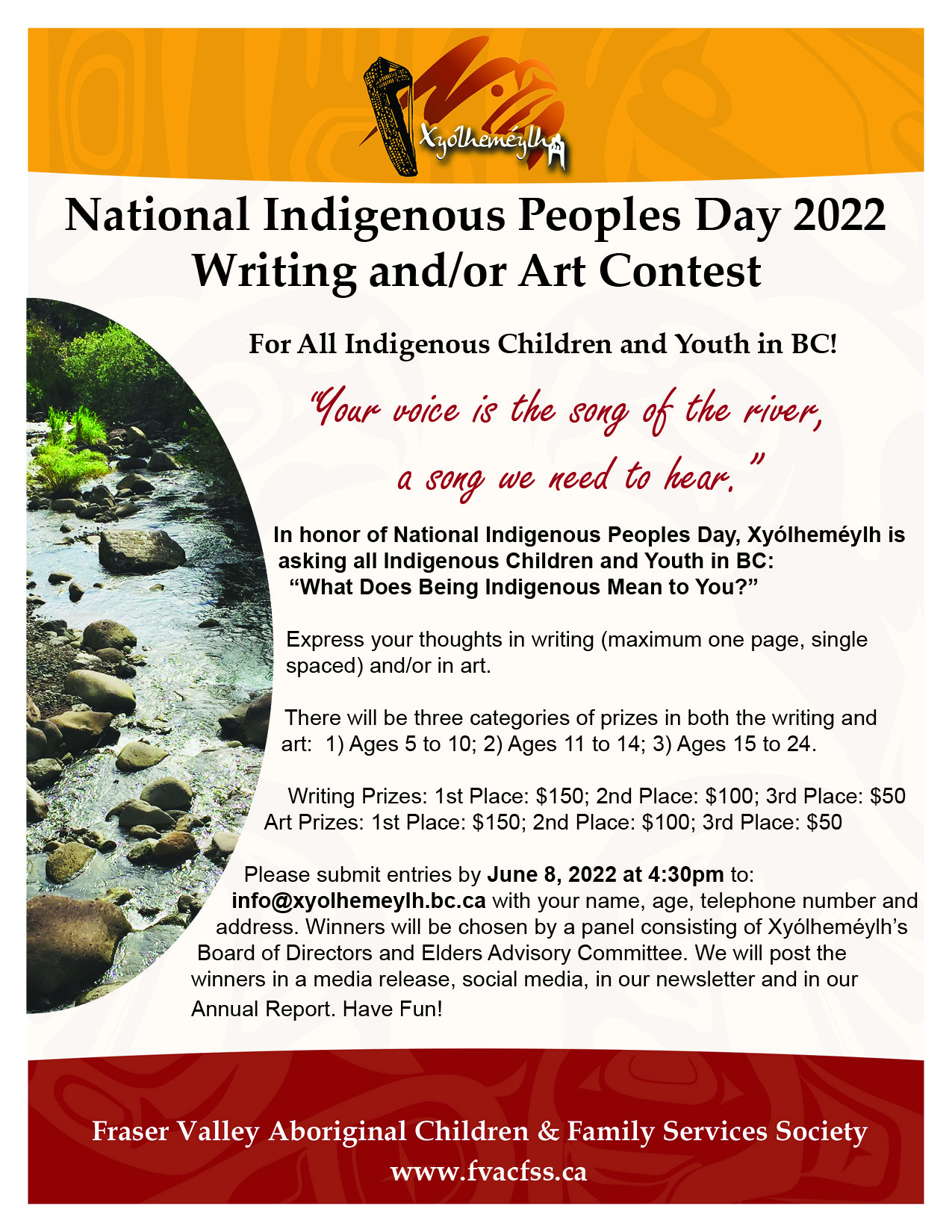
Please share our contest with the Indigenous children and youth in your life! The deadline for submissions is June 8!
Setting the table
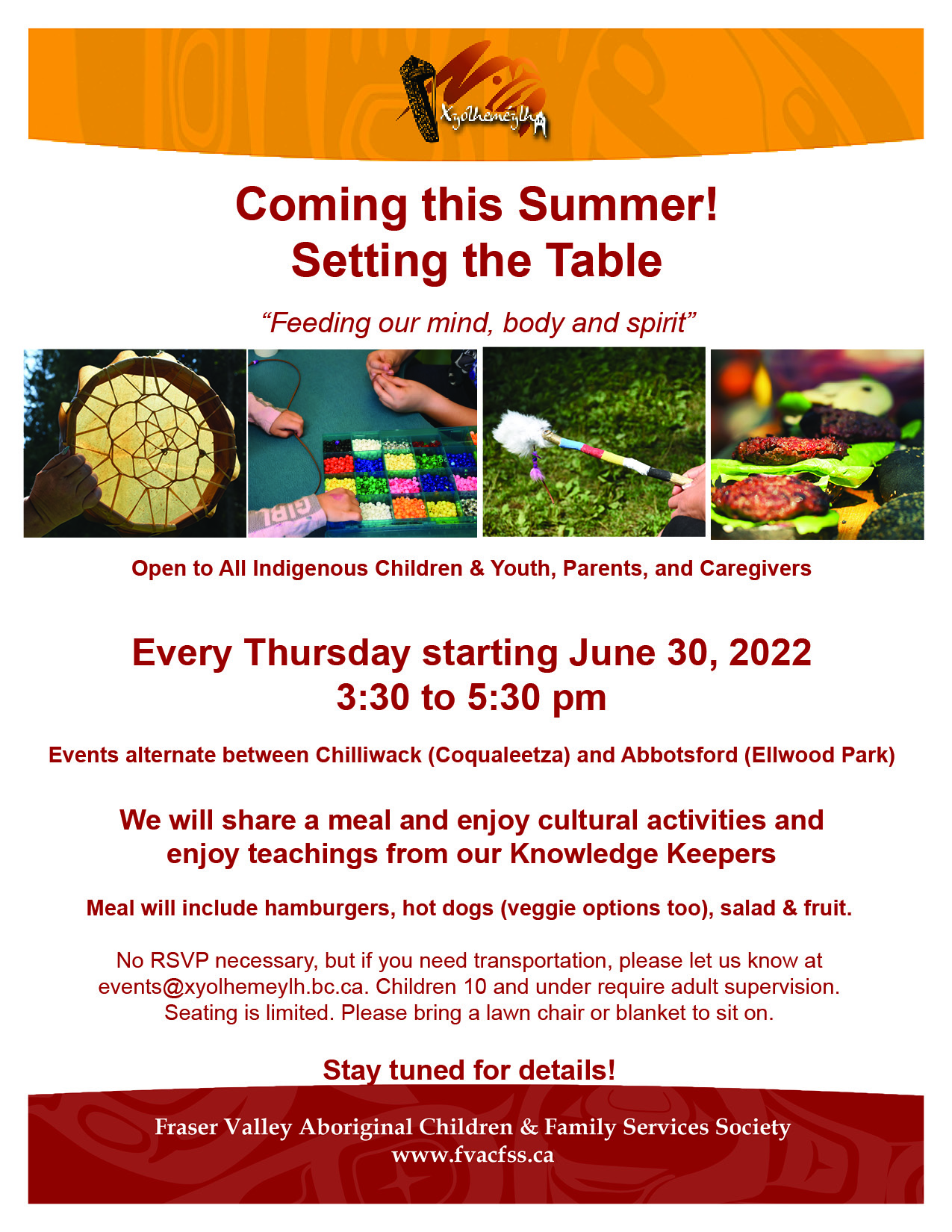
Please join us every Thursday this summer for food, cultural activities and teachings! Check our website under Events for more details closer to the date.
Save the Date! Back to batoche days July 21-24
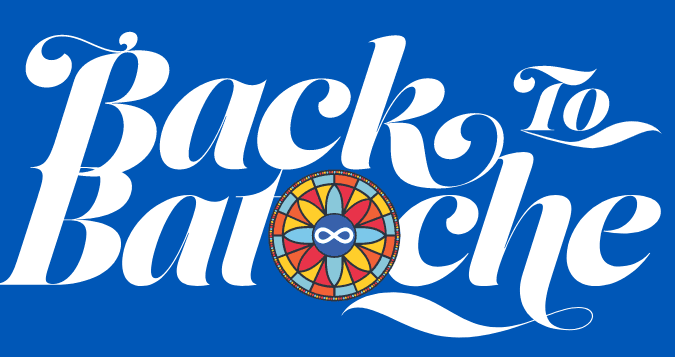
Back to Batoche celebrates the 50th anniversary of the in-person festival on July 21 – 24, 2022. It is four days of Métis culture, food, and music. Details about camp site bookings, calls for entertainment and services are available here: https://metisgathering.ca/back-to-batoche/
For Tzeachten Chief Derek Epp success in prevention programs is tempered by those left behind
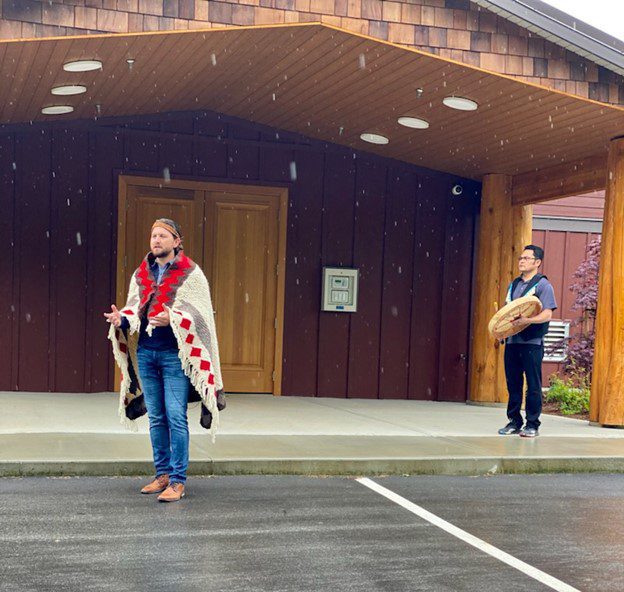
The following article was published in the Indigenous Child and Family Services Directors newsletter in March 2022 and features the good work happening in prevention in Stó:lō territory. Thank you to Indigenous Child and Family Services Directors for allowing us to republish the article.
When a Stó:lō mother of three passed away from cancer in 2021, the collaboration between family, Nation, and agency wrapped the kids in love and supported them to stay in community.
Prevention can be described as intervening early before there is a problem, and before child protection becomes involved. However, the interventions themselves can be incredibly varied. Prevention is not just “funding programs” as interventions must be rooted in culture and reflect the specific needs of the family and their community. Interventions are also connected to larger determinants of wellness.
The Tzeachten Nation is located east of Vancouver in the Fraser Valley Region, near Chilliwack. The Nation is politically affiliated with the Stó:lō Nation and is one of 17 Nations supported by Xyólheméylh , the largest fully delegated Indigenous Child and Family Service Agency in BC. Through collaboration, they have experienced inspiring successes in prevention work.
In the fall of 2021, a young Tzeachten woman, mother of three, faced a short battle with cancer. Tzeachten First Nation Chief Weli’leq Derek Epp speaks of this emotional time of letting go and grieving and the Nation’s desire to give the family the time and space to do this important work.
“Following the loss, we gave the family the space they needed to adjust to their new living situation while ensuring the necessary supports were in place for the children, grandparents and great-grandmother.”
Through collaboration between family, Nation, and agency and access to needs-based prevention funding, a plan was created for the children to remain with their grandparents and great-grandmother and to see their mother as much as possible before her passing. Distance was a barrier, so the Community Health Worker provided rides to the Cancer Clinic which was a 40-minute drive away. The family was provided meals when away from home on visits and further supported in the home through the provision of food hampers, basic necessities, and respite when needed.
Understanding just how hard the holidays can be, great efforts were made to ensure that the children’s first Christmas without their mother was special. As the months wore on, it became clear that the family needed a larger living space. The family was invited to tour one of Tzeachten’s new townhouse developments, and they decided it was right for them. Prevention funding enabled them to move into a furnished home, close to necessary support services and family connections.
Chief Epp said that “Up until recent years, we unfortunately have not had the luxury to meet our families needs with regards to on-reserve prevention services,” he continues “Through the prevention funding we received, we were able to empower the family to develop a plan to meet their new needs.” One of the hallmarks of the collaboration was how the Nation and agency followed the family’s interest, readiness, and need.
In this case, prevention took a number of forms. It was a home that met the family’s needs. It was a time and space to grieve. It was recognized that grandparents may need different resources and supports than other caregivers. Chief Derek Epp states that “The collaboration that went into this process was truly the definition of prevention…it’s situations like this that keep us all going and watching the family thrive makes it all worth it.”
Penny Trites, Executive Director of Staff and Community Relations at Xyólheméylh, explained how new prevention funding the Federal Government (ISC) provides has made a marked difference in the work they do and in the lives of the families and communities they serve. The agency has been able to build trust with communities and create culturally safe spaces. They now lease space in 6 of the 17 Nations they serve, enabling them to provide in-community workers, with plans to expand to more communities. Approaches to culture are nuanced and locally-based as there is a shift toward “Doing true Indigenous social work, not Indigenizing social work” says Trites.
This shift has been marked by needs-based supports; planning with, and not for, families and communities; and the firm guidance of an Elders’ Advisory table. According to Trites, the agency is able to see the bigger picture as knowledge of a family may go back generations. All of this means that the number of kids living out-of-care (in family placements) has risen dramatically, and ‘stranger placements’ are becoming rare.
However, both Chief Epp and Trites share their concern for Nation members living out of community, often due to factors such as lack of housing or employment.
If the family in the story shared by Chief Epp had been living in an urban centre, instead of in community, the outcome would have been very different.
“Unfortunately, our members who reside off-reserve and urban Indigenous brothers, sisters, and families have not shared this recent success,” said Chief Epp, “It is sad to see so many families left behind due to systemic inadequacies.”
Trites is clear on this point “If we are actually following federal legislation – it needs to be equality of services for all, regardless of where someone resides. Otherwise, it is just another form of discrimination and an ongoing human rights violation.” She continues that “These children and youth have an inherent right to identity” and community and cultural connections.
Trites continues, “Historically, in community – everyone knew what everyone’s roles were, hunter, speaker, healer, and that is why the prevention funding works in community, because people know who does what and who to go to. But for those living away from home, they don’t often know where to go for support.” She further explains that the services available to families living out of community are often not culturally safe, meaning families are less likely to seek help.
Having worked for many years at MCFD in the past, Trites explains that the funding gaps for Indigenous families were not clear to her until she began working in an Indigenous Child and Family Service Agency, stating “You can’t know until you’re actually here.” Until recently, families living in community received little to no prevention funding. However, now that prevention funding is available for those in community, it has widened the gap for those relatives living away from their home who are not eligible for these supports.
Chief Epp is confident that this will be corrected.
“I am optimistic Xyólheméylh will soon access the same level of prevention funding from the Provincial Government to align with the funding offered from ISC to support children, youth and families they serve regardless of where they live. We have a saying in Halq’eméylem. Syós:ys lets’e th’ále, lets’emó:t, which means one heart, one mind, working together for a common purpose. This speaks to the traditional teachings of the Stó:lō people to take care of all our Indigenous relatives who live in our territory.”
Media Contact
Mary Teegee (Maaxw Gibuu)(250)-612-8710[email protected]
Missing & murdered indigenous women and girls
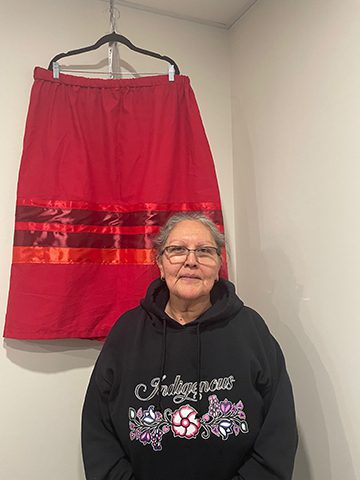
May 5 was Missing and Murdered Indigenous Women and Girls Day in Canada. It is a day we acknowledge the high and disproportionate rates of violence experienced by Indigenous women and girls. It is also a day we remember and honor those women and girls who have been murdered or missing and those whose lives have
been forever changed by violence toward Indigenous women and girls, and to help support the survivors and the families affect by this violence and needless tragedies.
The Red Dress has become a symbol of an Indigenous woman or girl who is missing or murdered. Xyólheméylh Elder Julie George created a Red Dress which is hanging in the Youth Hub in Chilliwack.
The whyse approach with sandy balascak for caregiver support parents
